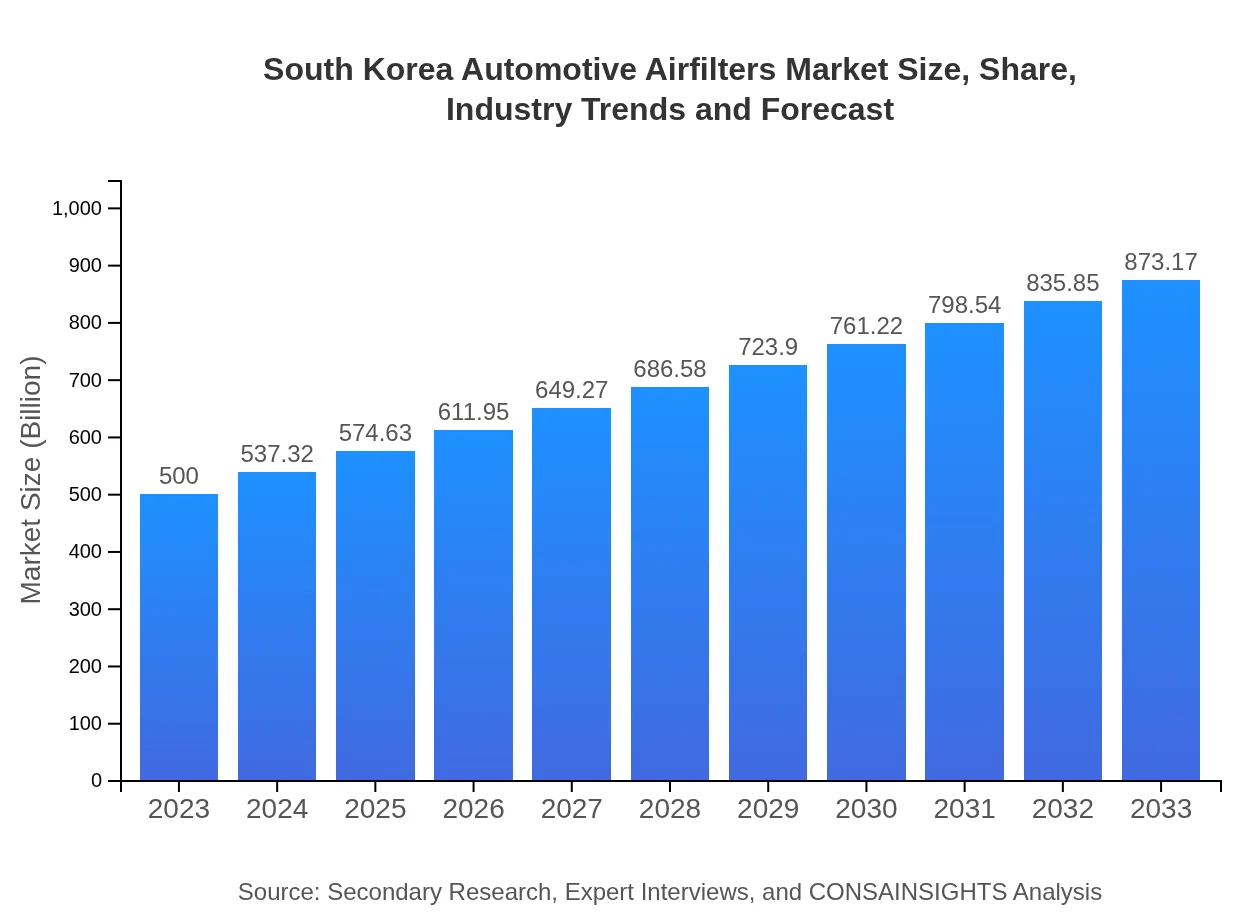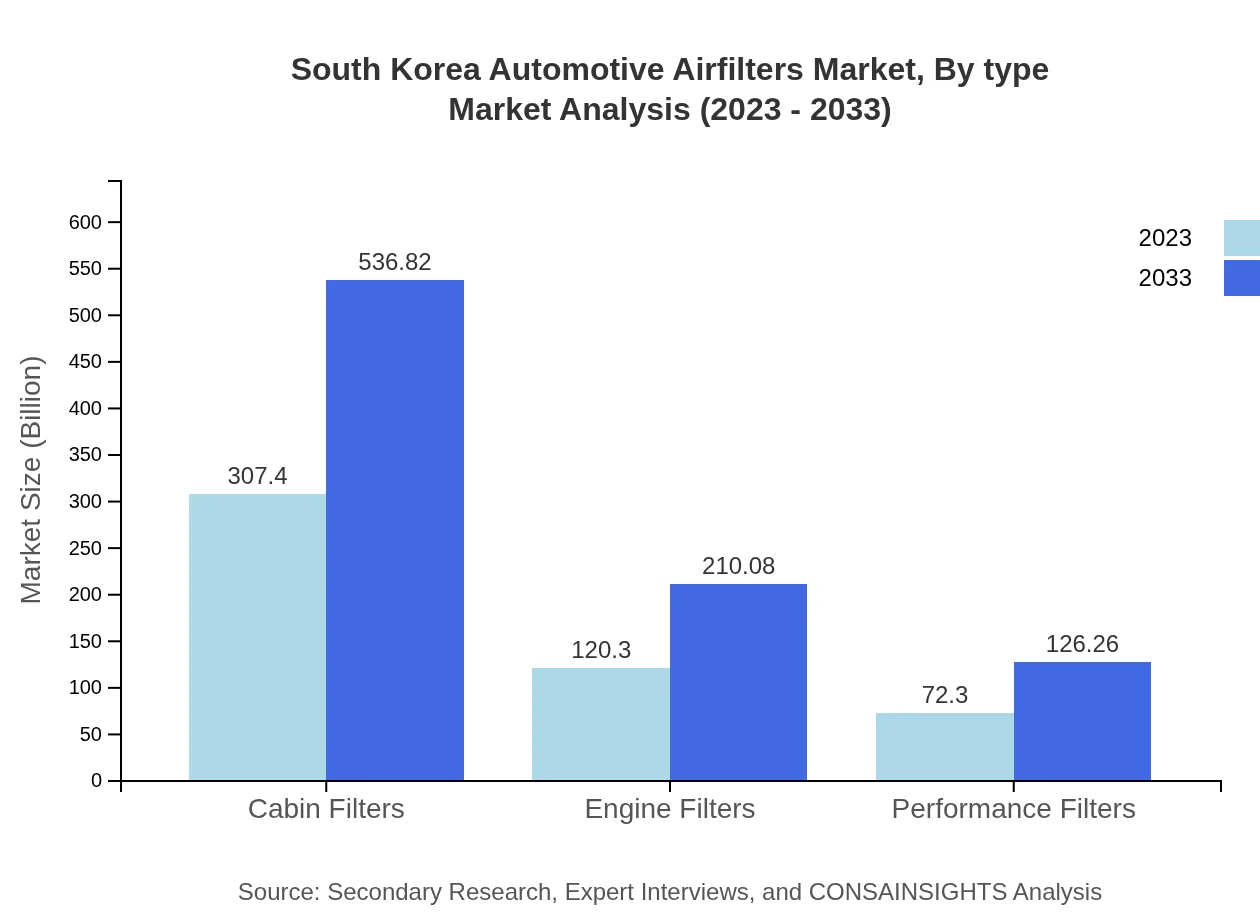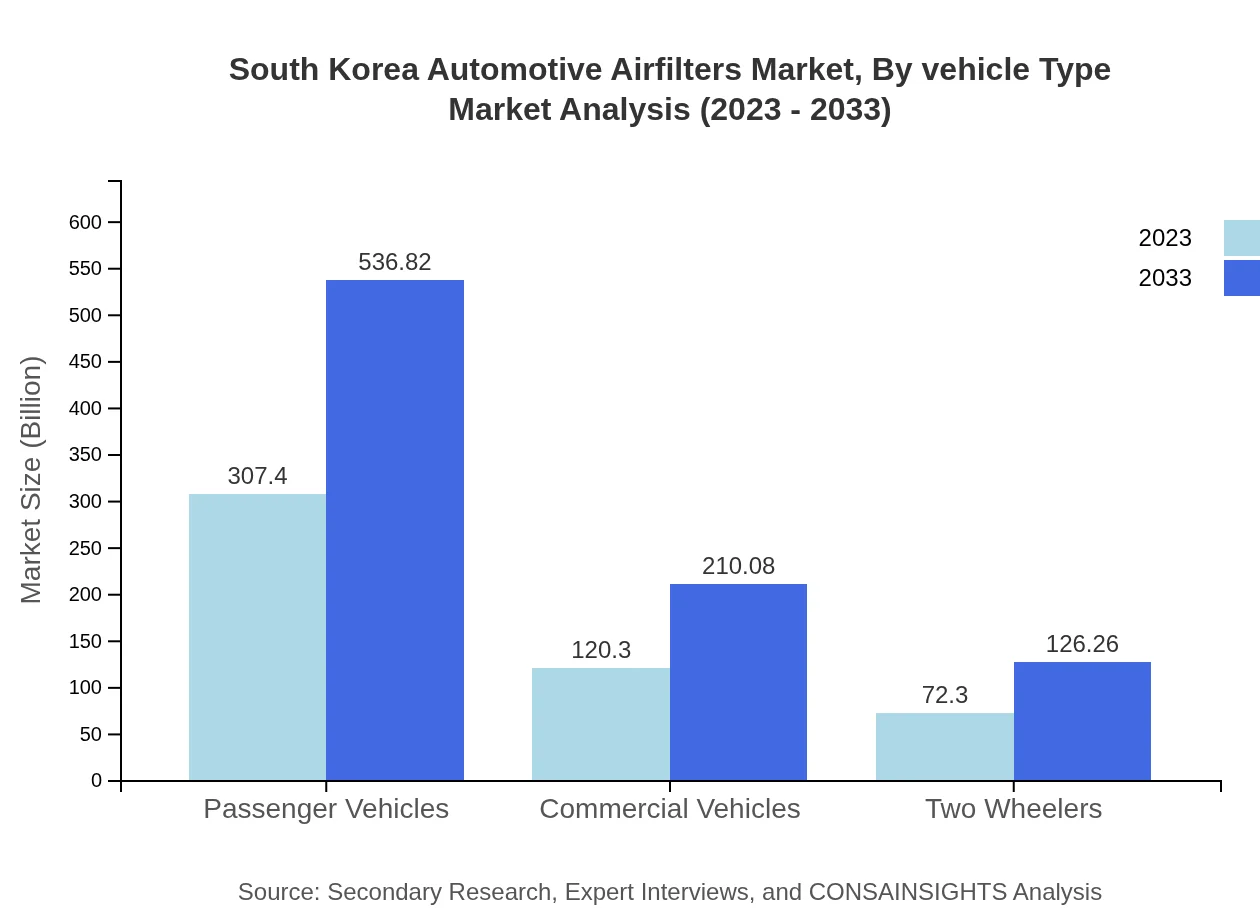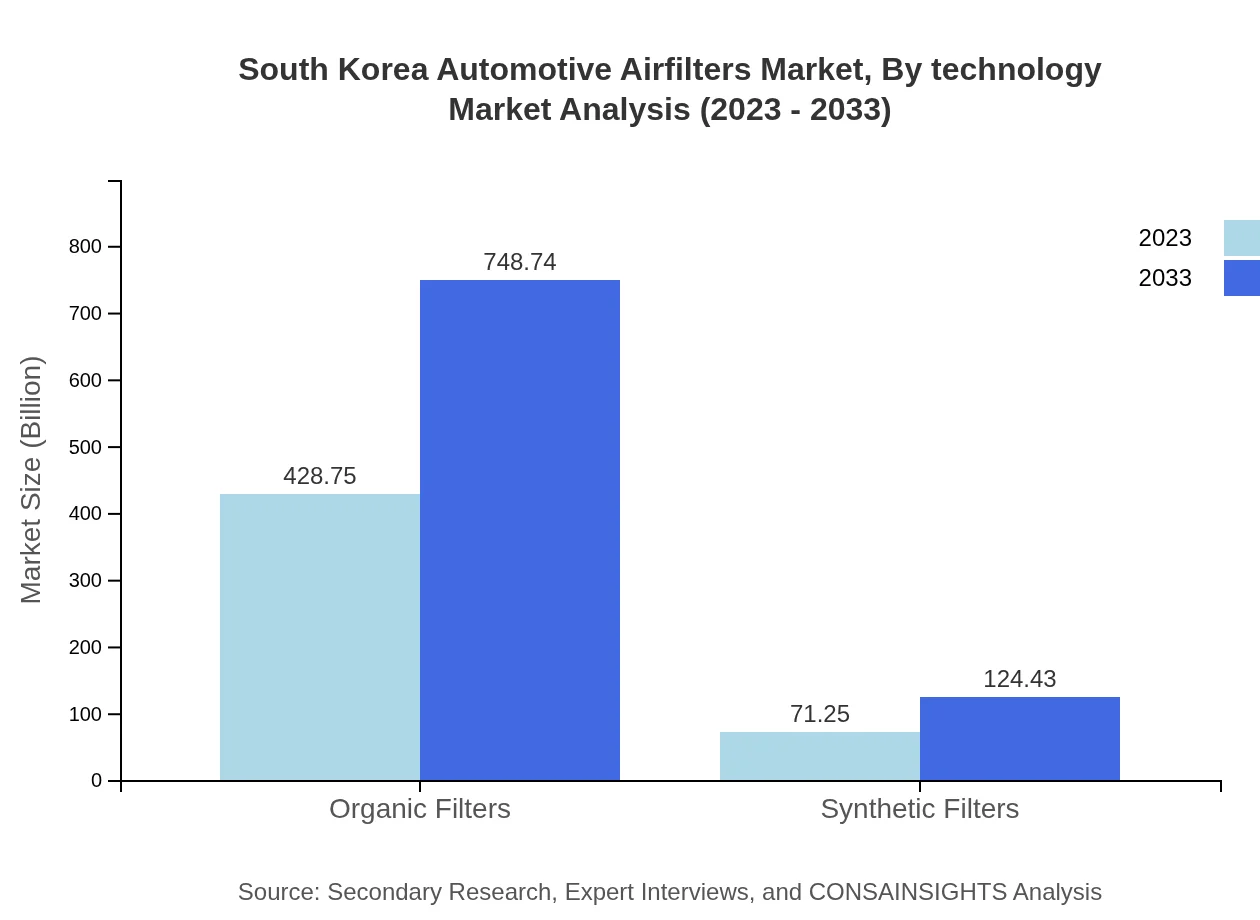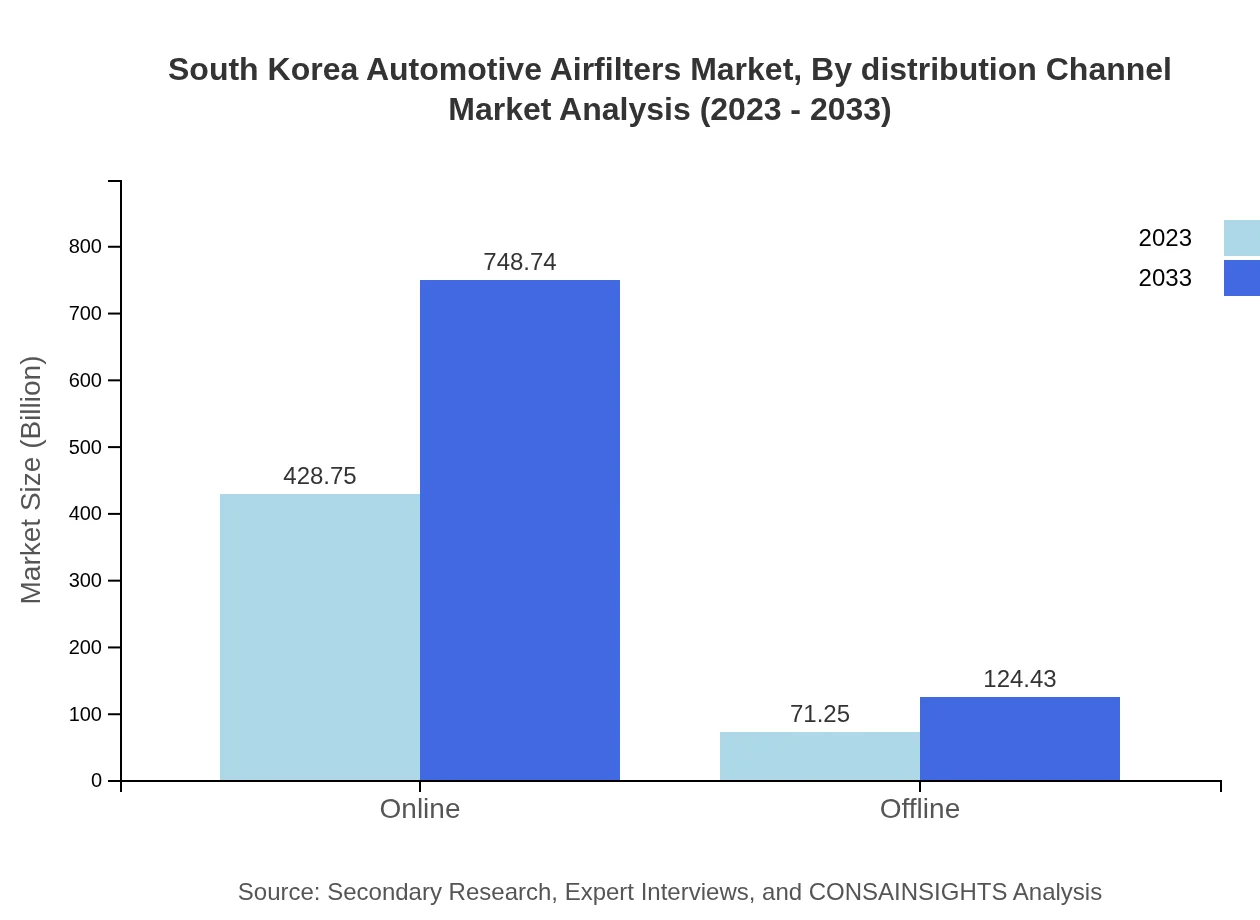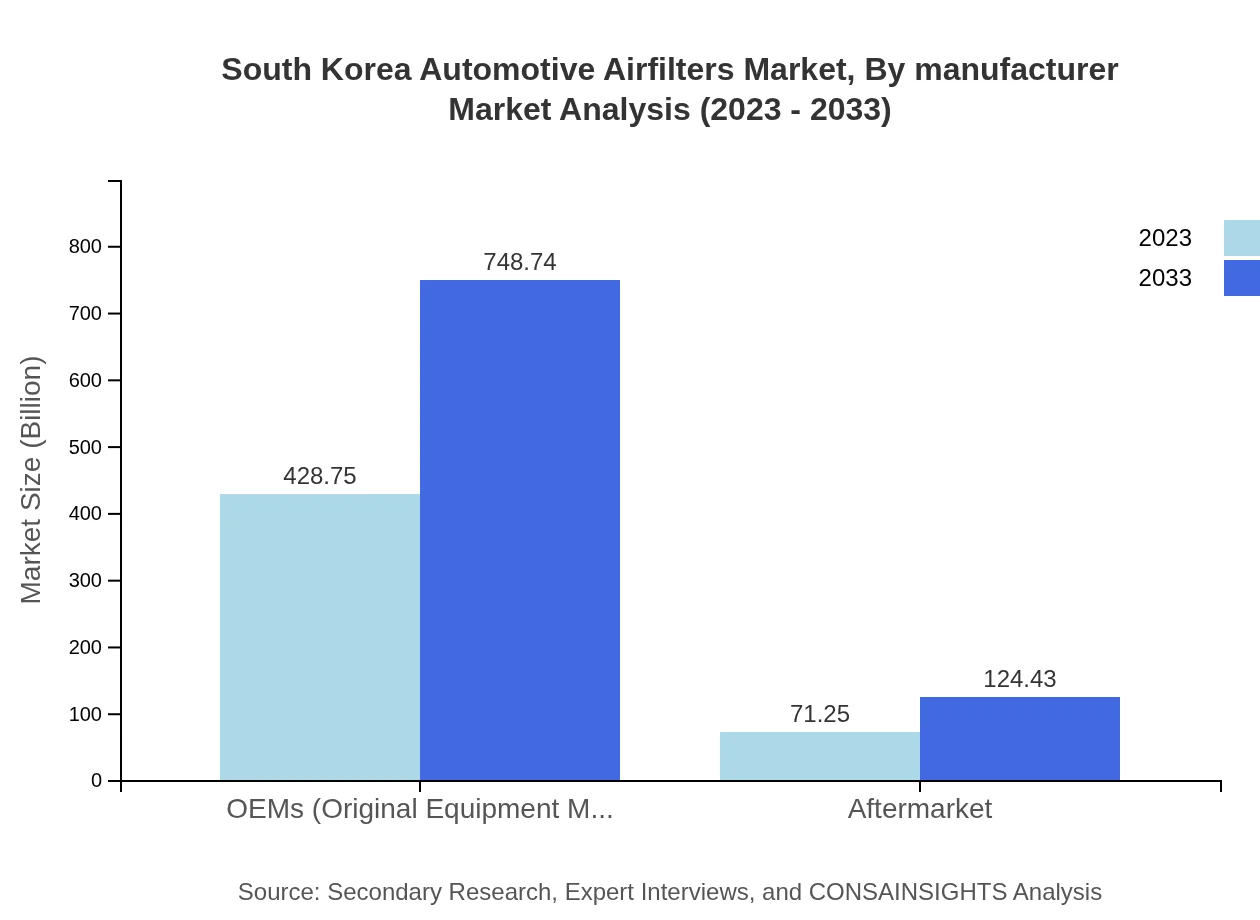South Korea Automotive Airfilters Market Report
Published Date: 02 February 2026 | Report Code: south-korea-automotive-airfilters
South Korea Automotive Airfilters Market Size, Share, Industry Trends and Forecast to 2033
This report provides comprehensive insights into the South Korea automotive airfilters market, covering crucial data and forecasts from 2023 to 2033. It includes market size, trends, segmentation, and analysis, offering valuable perspectives for stakeholders in the automotive industry.
| Metric | Value |
|---|---|
| Study Period | 2023 - 2033 |
| 2023 Market Size | $500.00 Million |
| CAGR (2023-2033) | 5.6% |
| 2033 Market Size | $873.17 Million |
| Top Companies | Mann+Hummel, K&N Engineering, Denso Corporation |
| Last Modified Date | 02 February 2026 |
South Korea Automotive Airfilters Market Overview
Customize South Korea Automotive Airfilters Market Report market research report
- ✔ Get in-depth analysis of South Korea Automotive Airfilters market size, growth, and forecasts.
- ✔ Understand South Korea Automotive Airfilters's regional dynamics and industry-specific trends.
- ✔ Identify potential applications, end-user demand, and growth segments in South Korea Automotive Airfilters
What is the Market Size & CAGR of South Korea Automotive Airfilters market in 2023?
South Korea Automotive Airfilters Industry Analysis
South Korea Automotive Airfilters Market Segmentation and Scope
Tell us your focus area and get a customized research report.
South Korea Automotive Airfilters Market Analysis By Type
The market by type reveals impressive growth across various segments. Organic filters dominate the market with a size of $428.75 million in 2023, projected to increase to $748.74 million by 2033, holding an 85.75% share. Cabin filters, with a market size of $307.40 million in 2023, indicate a stable growth path as consumer preferences lean towards improved air quality. Engine filters also hold significant importance, valued at $120.30 million currently, expected to see growth to $210.08 million by 2033.
South Korea Automotive Airfilters Market Analysis By Vehicle Type
Passenger vehicles represent the largest segment, comprising 61.48% of the total market share with a value of $307.40 million in 2023, projected to rise to $536.82 million by 2033. Commercial vehicles follow with a 24.06% share valued at $120.30 million in 2023, and an anticipated growth to $210.08 million over the decade. Two-wheelers reflect a smaller market share yet significant growth potential from $72.30 million in 2023 to $126.26 million by 2033.
South Korea Automotive Airfilters Market Analysis By Technology
The technology segment contributes to the market's evolution, with increasing incorporation of advanced filtration technologies. Organic filters take the lead with an 85.75% share, highlighting their preference due to sustainability. Synthetic filters are also significant, making up a 14.25% market share with performance improvements being a crucial factor in consumer choice.
South Korea Automotive Airfilters Market Analysis By Distribution Channel
Distribution channels reflect a diverse approach in reaching consumers. Online channels dominate with a value of $428.75 million in 2023, projected to rise to $748.74 million by 2033, capturing 85.75% of the market share, thanks to the convenience of e-commerce. Offline channels remain vital, representing 14.25% of the market share, valued at $71.25 million in 2023.
South Korea Automotive Airfilters Market Analysis By Manufacturer
Manufacturers in the South Korea automotive airfilters market leverage innovations in product development and marketing to enhance their presence. Encouraging partnerships with automotive producers to incorporate air filters into vehicles at the OEM level remains a strategic focus, enhancing overall market competitiveness.
South Korea Automotive Airfilters Market Trends and Future Forecast
Tell us your focus area and get a customized research report.
Global Market Leaders and Top Companies in South Korea Automotive Airfilters Industry
Mann+Hummel:
A leading global filtration company known for its range of air and liquid filters, Mann+Hummel focuses on innovation and sustainability in its product offerings for the automotive sector.K&N Engineering:
K&N is famous for its high-performance air filters and has established a strong reputation in both the OEM and aftermarket segments, emphasizing performance and reliability.Denso Corporation:
Denso is a prominent supplier of advanced automotive technology and systems, particularly known for its innovative air filter solutions designed to enhance vehicle performance and efficiency.We're grateful to work with incredible clients.









FAQs
What is the market size of South Korea Automotive Airfilters?
The South Korea automotive air filters market is valued at approximately $500 million in 2023, with a projected CAGR of 5.6% through 2033, indicating significant growth potential in this sector.
What are the key market players or companies in this South Korea Automotive Airfilters industry?
Key players in the South Korea automotive air filters market include large companies specializing in filtration technologies and automotive components. These may encompass manufacturers leading in innovation and sustainability within the automotive aftermarket.
What are the primary factors driving the growth in the South Korea Automotive Airfilters industry?
The growth of the automotive air filters market in South Korea is driven by increasing vehicle production, rising awareness about air quality, and advancements in filter technology that enhance vehicle performance and fuel efficiency.
Which region is the fastest Growing in the South Korea Automotive Airfilters?
Among various regions, North America exhibits the fastest growth in the automotive air filters market, projected to reach $294.69 million by 2033, up from $168.75 million in 2023, reflecting a substantial CAGR.
Does Consainsights provide customized market report data for the South Korea Automotive Airfilters industry?
Yes, Consainsights offers customized market report data tailored to specific queries in the South Korea automotive air filters industry, providing insights that best match client needs and strategic interests.
What deliverables can I expect from this South Korea Automotive Airfilters market research project?
Expect a comprehensive report comprised of market size analysis, growth forecasts, competitive landscape, segmentation breakdown, and insights into market trends and dynamics to guide your strategy in the automotive air filters sector.
What are the market trends of South Korea Automotive Airfilters?
Current trends in the South Korea automotive air filters market include a shift towards organic and synthetic filter materials, an increase in online sales channels, and a growing focus on sustainability and environmentally friendly products.

